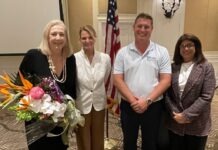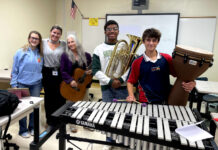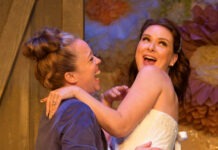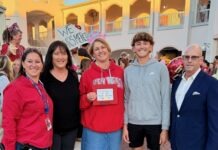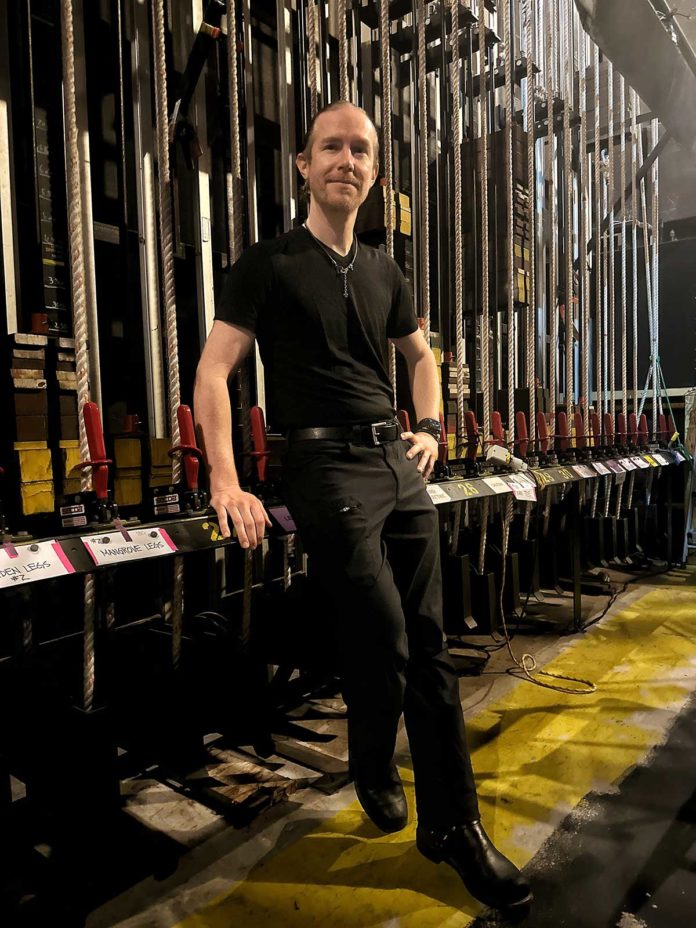
By Cricket Desmarais
Matthew Rawls scans the Tennessee Williams lobby, attending to last-minute details before the theater’s newly acquired production of “Nutcracker, Key West” opens. His focus is steady as is his demeanor, despite the 999 details he is responsible for. Tonight he’s wearing two hats — artistic director of the holiday classic, reimagined to celebrate our island’s reef, roosters and maritime heritage, which he helped debut with creator Joyce Stahl in 2005, and newly appointed executive director of the theater he began working with that same year.
Before this stage there were bayous and swamps. Rawls grew up playing in Alexandria, Louisiana – “a great place to be from,” he deadpans as only someone who has swum with crocs can. At 19, he got a gig at Dallas Children’s Theatre, then followed opportunity to Florida and New York before trading his Brooklyn theater job for one in Key West as the sound engineer and assistant technical director for the full-scale Broadway show and local production house.
His days begin early, with three black cats and partner Leigh Pujado — a dancer he met on the Tennessee Williams stage during one of her productions — in the home that’s both haven and orchid oasis. Work begins with a black stage floor, empty battens and space where the quintessential velvet proscenium curtains usually hang.
“By eight o’clock, it’s a full Broadway show and by 10:30, it’s all coming down,” he says. “By 4 a.m., it’s a black stage floor and an empty room again, and the only thing you have to show for it is the feeling of the production and the tiredness of the day.”
Depending on the show, there are trucks to unload, lighting and sound to check, scenery and sets to hang. With the hired help of 40 to 55 local extras and the tour’s crew of 12 to 18, everything should be “floating” by 4:30 p.m.
“They come in in chaos mode — the most stressful part — they have all the ideas, they have the passion for it, it’s almost there — and we take it from that, then present it in front of an audience. And then we tear it down and they go off to celebrate. Then we take the next show coming in, in chaos mode…”
It’s a 24-hour work day, but “the joy of the fleetingness of the art form” is worth it, Rawls says, giving a nod to the broader contribution it makes.
Theater’s value to society, Rawls says, is found in the shared experience it offers, especially as the digital world creates more isolation.
“At the end of the day, it’s a two-hour concert of somebody singing on stage, right? It doesn’t seem like it’s all that important, but it’s our culture that defines us. As long as we’re creating, we’re having a discussion about our culture and we’re relating to each other. You don’t do that in isolation. You do that in a room, laughing at a show where the scenery is all falling down and actors are just trying to get to the end of the game, as in ‘The Play That Goes Wrong.’ So even the most silly thing has true value to a society. That’s why we show up. We just want to keep that conversation going.”
Rawls has been part of hundreds of show productions during his 17 years there, most without a hiccup, some that required a bigger dose of the stamina, patience and the think-quick-on-your-feet wit for which he is known.
“It’s a lot of dealing with Murphy’s Law, so you just plan for everything to go wrong,” he says. “And just enough goes wrong that it keeps it interesting.”
Like the time a load-out took three tries to fit into the show’s tractor trailer; the first two with that production’s new crew and the last with just him and an old Metallica roadie at 3 a.m.
“Shows just have their own life. Things just kind of happen, and that’s the joy of it. It’s why we do live theater — because it’s in the moment. But we did keep a bottle of tequila, in a case, hanging on the wall of the greenroom, and when everything went to naught, like the scenery fell down, we’d gather everyone around, pour a shot and toast to the next one.”
I’ve performed on the TW stage a handful of times and can attest to Rawls’ ability to mellow the chaos with humor, tact and clarity — with or without tequila. Though he doesn’t believe in superpowers, one is his way of valuing all the players, regardless of their role or personality.
“You need those eccentric people. You need the overbearing director. You need the quiet scenic painter. You need all of those different personalities to create the art that we do,” he says. “Some of what I’ve done over my entire career is try to discover why people are in this art form and what they are trying to get out of the production. It’s different for every single human being — from the patron who’s watching it, to the usher volunteering their time, to the talent on stage, or the flyman pulling the rope to take the grand rag out. Everybody’s here for a different reason. It’s about trying to give them what that is to nourish them, so we can get the best performance out of all of them.”
What’s your superpower?: I think the belief in superpowers diminishes the accomplishments and sacrifices of the individuals who work tirelessly towards their goals and desires. I’d take average dreamers over magical powers every time.
Words to live by: Be kind, have patience. Make the most of the moment.
Hero: Keanu Reeves, both as a performer and human being.
Favorite production so far: “The Play That Goes Wrong” on Broadway. It was so over the top and hilariously silly.Something you want to learn: Everything. It’s a big world. There’s so much to discover.
